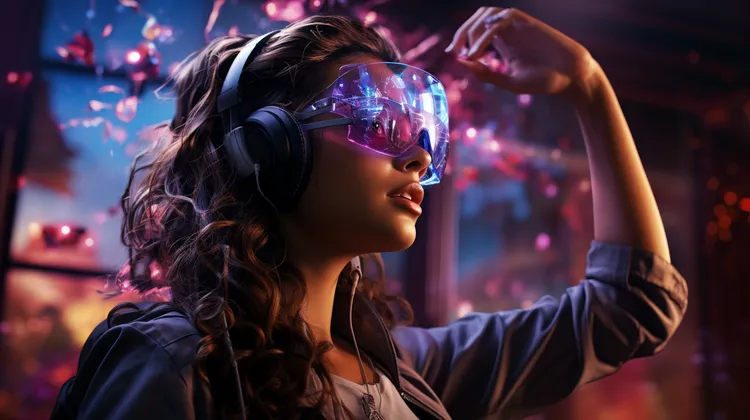The landscape of technology is perpetually evolving, and among its most groundbreaking advancements are the fields of artificial intelligence (AI), blockchain technology, and virtual worlds. As we move into 2024, these domains are not functioning in isolation anymore; instead, they are converging to create a unified future that is reshaping industries, experiences, and societal structures as we know them. This article explores how AI, blockchain, and virtual worlds are coming together to form a synergistic trio that could define the next era of digital evolution.
Artificial intelligence has progressed exponentially in its ability to interpret, learn from, and interact with the world. AI’s role in deciphering vast amounts of data has made it an invaluable tool for personalizing experiences within virtual worlds. These environments, once purely escapist domains, are evolving into sophisticated platforms for work, commerce, education, and social interaction. In this context, AI serves as a navigator, simplifying the complexities of highly immersive and interactive virtual spaces for participants.
Blockchain, Emerges as the backbone of trust and security in these intricate digital ecosystems. With its decentralized ledger technology, blockchain serves as an immutable record of transactions, ownership, and identity within virtual worlds. Through tokenization, it ensures that digital assets can be securely owned, traded, and leveraged across platforms. The convergence of AI and blockchain promises a more secure, transparent, and organized virtual space where transactions are quick, seamless, and trustworthy.
These technologies are also redefining the concept of virtual economies. Virtual goods and services are traded with the same gravitas as physical commodities, thanks to blockchain-enabled cryptocurrencies and smart contracts. AI-powered marketplaces within virtual worlds are becoming sophisticated, with automated services and personalized recommendations driving commerce. Predictive behaviors learned by AI help tailor the virtual economic experience to individual needs, enhancing engagement and retention.
In 2024, the fusion of AI and blockchain with virtual worlds is fueling the metaverse’s rise — a collective, shared virtual space that is persistently online and active. The metaverse is more than just a digital landscape; it’s a fully-functioning economy where users can live, work, and play. AI-driven avatars are not only populating these realms but also facilitating interactions, transactions, and providing assistance, thereby magnifying the metaverse’s allure and utility.
With the integration of these technologies, the potential for digital identity and reputation has grown profoundly. In virtual worlds, blockchain ensures that identities are verifiable and that digital reputations are maintained across various platforms. Meanwhile, AI assists in building these identities based on user behaviors, preferences, and interactions, allowing for a consistent and personalized experience that resonates throughout the digital domain.
The entertainment and media sectors are being revolutionized as well. Virtual reality (VR) concerts, augmented reality (AR) experiences, and AI-powered storytelling have taken immersive experiences to unprecedented heights. Blockchain enables creators to have greater control over their content and revenue streams through direct and secure transactions with their audience. The convergence of these technologies ensures that creators are rightfully compensated, and interactions between creators and consumers are transparent and streamlined.
Education and training have also embraced the unified future of AI, blockchain, and virtual worlds. AI tutors provide personalized learning experiences, adapting content to individual learning styles and progress. Blockchain technology, with its ability to securely store and share certification, is enhancing credibility and record-keeping in educational virtual environments. Lifelike simulations and interactive courses in virtual worlds have transformed the educational landscape, making learning more engaging and accessible.
The employment sector is witnessing a similar transformation. Virtual offices and collaboration spaces, underpinned by blockchain’s security framework allow for reliable remote working conditions. AI’s role in managing workflows, combined with virtual worlds’ capacity for immersive meetings and workspaces, has redefined what it means to work “together” in a digital age.
In healthcare, AI’s predictive analytics, combined with virtual world simulations, are advancing medical training and patient care. The use of blockchain for securely managing patient records in virtual healthcare settings ensures privacy and data integrity, signifying great strides in telemedicine and personalized patient engagement.
The integration of AI, blockchain, and virtual worlds profoundly affects governance and civic engagement. Smart cities are leveraging this technology convergence to manage resources more effectively, engage citizens through virtual town halls, and secure civic data through blockchain. AI assists in analyzing large datasets to improve urban planning and enhance the quality of life, with virtual simulations providing a testbed for policy decisions.
Consumer banking and finance have not remained untouched by these advancements. Personalized financial advice from AI bots, blockchain-based currencies, and immersive virtual banking experiences are transforming how individuals manage their finances, making financial literacy and services more accessible and engaging.
As we continue to traverse this unified future in 2024, it is evident that the convergence of AI, blockchain, and virtual worlds is catalyzing a transformation across multiple dimensions of our lives. While these technologies engender boundless opportunities, we must be mindful of the challenges they present, such as privacy concerns, ethical use of AI, and digital divide issues. We must foster a spirit of responsible innovation and inclusive growth to ensure that the benefits of this convergence are accessible to all.
Looking forward, the synergy among AI, blockchain, and virtual worlds is expected to deepen, driving further innovation and leading us into an era that was once the realm of science fiction. With careful stewardship and a focus on ethical implementation, the future of AI, blockchain, and virtual worlds will not just be a technological marvel but a foundational shift towards a more interconnected and enriched human experience.




Virtual simulations for urban planning? That’s some futuristic stuff right there! 🏙️🔮
AI-powered storytelling is my new favorite thing. This article nailed the excitement around it! 🎨📖